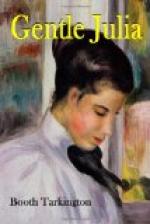Where the light fell clearest from the cobwebby windows at the ground level overhead, he had placed a long deal table, once a helpmate in the kitchen, but now a colourless antique on three legs and two starch boxes. Upon the table were seven or eight glass jars, formerly used for preserves and pickles, and a dozen jelly glasses (with only streaks and bits of jelly in them now) and five or six small round pasteboard pill-boxes. The jars were covered, some with their own patent tops, others with shingles or bits of board, and one with a brick. The jelly glasses stood inverted, and were inhabited; so were the preserve jars and pickle jars; and so were the pill-boxes, which evidently contained star boarders, for they were pierced with “breathing holes,” and one of them, standing upon its side like a little wheel, now and then moved in a faint, ghostly manner as if about to start rolling on its own account—whereupon Herbert glanced up and addressed it sternly, though somewhat inconsistently: “You shut up!”
In the display of so much experimental paraphernalia, there may have been a hint that Herbert’s was a scientific nature craving rather quantity than quality; his collection certainly possessed the virtue of multitudinousness, if that be a virtue; and the birds in the neighbourhood must have been undergoing a great deal of disappointment. In brief, as many bugs as Herbert now owned have seldom been seen in the custody of any private individual. And nearly all of them were alive, energetic and swearing, though several of the preserve jars had been imperfectly drained of their heavy syrups, and in one of them a great many spiders seemed to be having, of the whole collection, the poorest time; being pretty well mired down and yet still subject to disagreements among themselves. The habits of this group, under such unusual surroundings, formed the subject of Herbert’s special study at the moment of Florence’s arrival. He was seated at the table and frowning with science as he observed the unfortunates through that magnifying-glass, his discovery of which was responsible for their present condition and his own choice of a career.
Florence paused in the doorway, but he gave no sign of recognition, unless his intensified preoccupation was a sign, and Florence, perceiving what line of conduct he meant to adopt, instinctively selected a reciprocal one for herself. “Herbert Atwater, you ought to be punished! I’m goin’ to tell your father and mother.”
“You g’way,” Herbert returned, unmoved; and, without condescending to give her a glance, he set down the magnifying-glass, and with a pencil wrote something profoundly entomological in a soiled memorandum book upon the table. “Run away, Flor’nce. Run away somewheres and play.”
Florence approached. “’Play’!” she echoed tartly. “I should think you wouldn’t talk much about ‘playin’,’ the way you’re teasing those poor, poor little bugs!”
“’Teasing’!” Herbert exclaimed: “That shows! That shows!”




